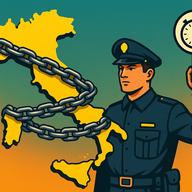About the author
I hold a Ph.D. in Computer Science, with a research focus on Internet Routing Security, where I developed tools and methodologies for the automated verification of BGP configurations. With over 30 years of technical and project experience, I am coauthor of the book BGP from
Theory to Practice, aimed at both technical and academic audiences, and of the outreach volume ”Parlami di TEch”, designed to make technology accessible to broader audiences.
During the course of my career, I have served as Chief Technical Officer for several Italian ISPs, and have been a MANRS (Mutually Agreed Norms for Routing Security) Ambassador and member of its Steering Committee, actively promoting global best practices for Internet routing security. Since 2022, I have been a member of the RIPE Programme Committee, contributing to the review and selection of scientific presentations at European community conferences.
I have delivered seminars and lectures on Internet and Network Architectures at the University of Camerino and Pescara, and have taught DNS, Internet Governance, and BGP at the Namex School of Advanced Networking, helping to train the next generation of network professionals.




“I want to thank you for your article and for the mention of IX.br, and confirm that the article’s description about its wide geographical coverage helping to absorb massive traffic increases is accurate. I would also like to emphasize that the adequate scaling and dimensioning of the largest IXPs: São Paulo, the largest in the world, Fortaleza, and Rio de Janeiro, has been fundamental in supporting the growing traffic demand. However, I want to clarify that stating the coordination is public or state-led is not correct. CGI.br works in the public interest, as does NIC.br, but the coordination of IX.br is multistakeholder through CGI.br, with balanced participation from the public sector, private sector, civil society, and academia. I also want to clarify that no government funds are involved in IX.br. NIC.br is a private non-profit entity that manages IX.br and other initiatives, funded with private resources mainly from the registration of .br domains, while following the guidelines established by the multistakeholder council CGI.br, which guides public policies for the Internet in Brazil. I remain available for any further clarifications.”
Muito obrigado, Antonio, tanto pela leitura quanto pela importante correção. I’ve now updated my internal notes to reflect this. I’m grateful for your detailed comment, and I will make sure any future references distinguish clearly between multistakeholder coordination and state operation.
“Antonio, I together with Keith Mitchell created LINX in the very early days of the Internet. A key factor you miss is actually the reason we created the LINX. It stops large ISPs from extorting "Taxes" from smaller ISPs. The key here is if a large ISP seeks to restrict traffic, the IXPs provide a route around the blockage. We can see how Deutsche Telecom have tried repeatedly to muscle traffic to their advantage and have been repeatedly thwarted. might form a cartel to maximise their profits. The agreements that are the basis of the whole commercial Internet are underwritten by the IXPs. I have an incomplete paper on IXPs available which explain much that may have been forgotten”
Thank you, Peter, for your comment and for reminding us of the foundational motivations behind the creation of LINX. Your point is absolutely crucial: IXPs are not only about performance and resilience, but also about market fairness and interconnection freedom. It would be very valuable to include historical reflections like yours: if you’re open to sharing the incomplete paper you mentioned, I’d be keen to read it and possibly reference it in future revisions or spin-offs of the article. Thank you again for your contribution and for helping make the Internet what it is today.
It would be interesting to have an addition to this fine article on the position of the Internet within cyberspace.
Showing 3 comment(s)